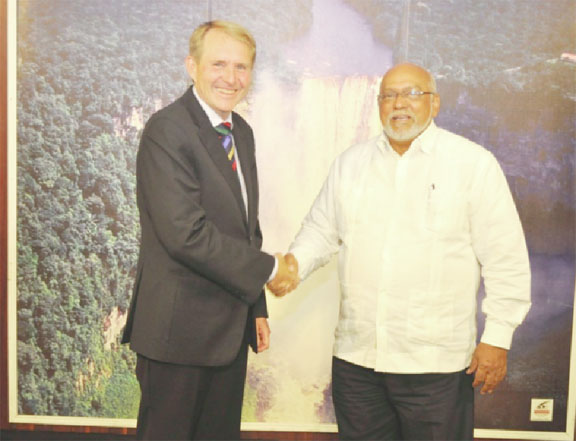Joint cooperation efforts of the Caribbean Community (Caricom) and Australia have contributed to the achievement of a globally binding arms treaty being concluded by the United Nations General Assembly.
According to a release from the Caricom Secretariat, Caricom Secretary-General Ambassador Irwin LaRocque on Thursday highlighted this feat when he accepted the Letters of Credence of Ross William Tysoe, the new Non-Resident Plenipotentiary Representative of Australia to Caricom, at the Caricom Secretariat.
The Secretary-General said, “Collaboration, had allowed ‘our countries’ voices to be better heard by the international community and our position to be better understood.”
LaRocque said, “We have jointly lobbied for the adoption of a robust Arms Trade Treaty (ATT) which would address the proliferation of small arms and light weapons (SALW) – a threat to the very fabric of Caribbean societies.” He added that the treaty was “a tribute to the multilateral process that allowed the global family of nations to partner in the pursuit of the safety and best interests of the global community through negotiation, compromised and democratic process.”

The release said that the Secretary-General outlined several other successful areas of collaboration that have characterised the maturation of cooperation between Caricom and Australia, formalised in November 2009. That cooperation framework had been established within the margins of the Common-wealth Heads of Government Meeting (CHOGM), in Port of Spain, Trinidad and Tobago, between the leaders of Caricom and Australia.
At that meeting, a Memo-randum of Understanding paved the way for Australia to make some $60 million (AUS) available over four years to Caricom for cooperation in areas of mutual interest including climate change, disaster risk reduction and emergency management; regional integration, including trade facilitation; education, including in the fields of science and technology, provision of scholarships and training of diplomats; university co-operation; food security and agricultural co-operation; renewable energy, microfinance; border security and sport, youth and culture.
The release said that the Secretary-General pointed out that since that first formal meeting, Caricom-Australia relations have developed with “remarkable alacrity and depth.”
LaRocque drew attention to the significant support Australia provided in Haiti’s earthquake recovery, re-vegetation efforts, and improvement to the sanitation facilities in order to combat the scourge of cholera in the Member State.
He stated that technical cooperation between the two parties would only deepen and widen in the coming years, pointing to the implementation of a practicable solution to prevent Non-Communicable Diseases in Caricom and the Pacific region, and the development of innovative and entrepreneurial opportunities for youth.
The release said that the Australian Plenipotentiary Representative described the Caricom-Australia relations as “effective and mature” growing from a donor delivery platform to one of “genuine collaboration.”
The Australian envoy praised what he described as “impressive work” being carried out by the Caribbean Community Climate Change Centre (CCCCC) in Belize, which he experienced first-hand during a recent visit there.
He lauded the Centre’s effective management of Australia’s technical and cooperation assistance in supporting Belize’s Barrier Reef Marine System, adding that Australia was pleased to have contributed to this project which also provided early warning for climate change.




